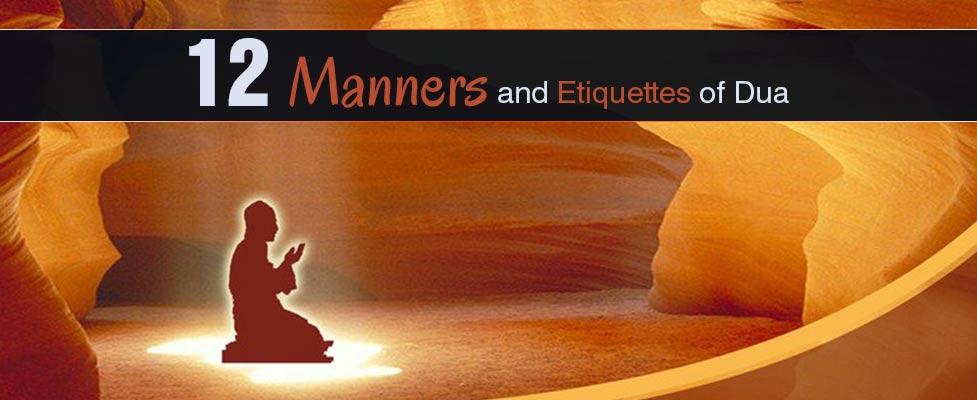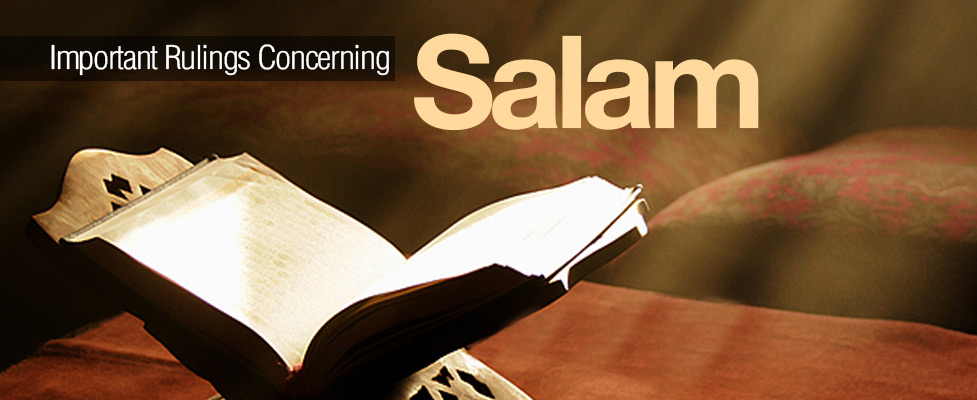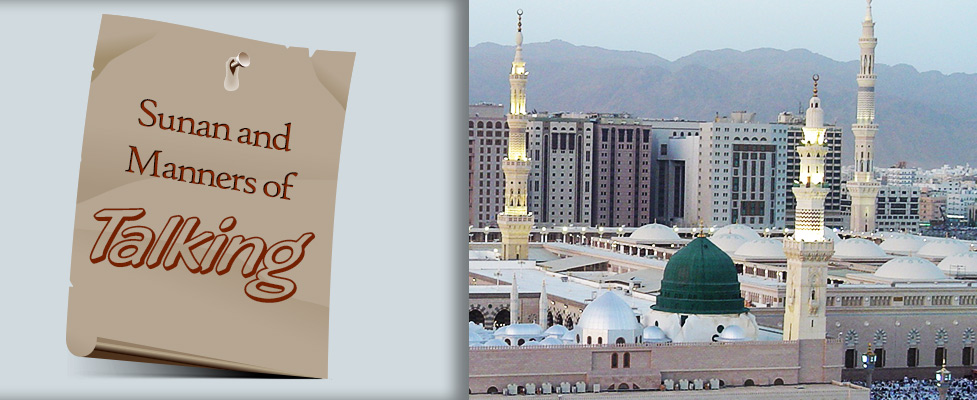In our daily life, we visit houses of our relatives, friends and loved ones from time to time. So, we must know what the method of entering a house is in light of the blessed Sunnah. If we visit someone’s house, should we stand in front of the door or at a side? How do we ask permission to enter the house? If we are not granted permission to enter, what should we do? What are the blessings of reciting the Dua of exiting the house? What should be recited if no one is present in the house? There are various Sunan and manners with regards to entering a house and asking permission to enter a house etc. Let us discuss a few of them today:
- Give Salam when you enter or exit your house. The Beloved and Blessed Prophet صَلَّی اللہُ تَعَالٰی عَلَیْہِ وَاٰلِہٖ وَسَلَّمَsaid: When you enter the house, give Salam to the residents of the house and when you leave, leave after giving Salam.
(Shu’ab-ul-Iman)
Hakim -ul- Ummat Mufti Ahmed Yar Khan Naeemi رَحْمَۃُ اللہِ تَعَالٰی عَلَیْہِ writes on page 9 of Mir’at -ul- Manajih, Volume 9: Some pious people have been observed to follow this practice that when they would enter the house for the first time at the beginning of the day, they would recite Bismillah and Sura Ikhlas, as it keeps the family united and causes to increases sustenance.
- Whoever enters the house without invoking the name of Almighty Allah, Satan also enters the house alongside him. Hence, Sayyiduna Jabir رَضِیَ اللہُ تَعَالٰی عَنْہُreports that the Noble Messenger صَلَّی اللہُ تَعَالٰی عَلَیْہِ وَاٰلِہٖ وَسَلَّمَsaid:
إِذَا دَخَلَ الرَّجُلُ بَيْتَهُ فَذَكَرَ اللَّهَ عِنْدَ دُخُولِهِ وَعِنْدَ طَعَامِهِ قَالَ الشَّيْطَانُ لاَ مَبِيتَ لَكُمْ وَلاَ عَشَاءَ . وَإِذَا دَخَلَ فَلَمْ يَذْكُرِ اللَّهَ عِنْدَ دُخُولِهِ قَالَ الشَّيْطَانُ أَدْرَكْتُمُ الْمَبِيتَ . وَإِذَا لَمْ يَذْكُرِ اللَّهَ عِنْدَ طَعَامِهِ قَالَ أَدْرَكْتُمُ الْمَبِيتَ وَالْعَشَاءَ
“When a person enters his house and mentions the name of Allah at the time of entering it and while eating the food, Satan says: You have no place to spend the night and no meal; but when he enters without mentioning the name of Allah, the Satan says: You have found a place to spend the night, and when he does not mention the name of Allah while eating food, the Satan says: You have found a place to spend the night and a meal.”
(Sahih Muslim)
- The fortunate person who, when leaving his house, recites the Dua of exiting the house, he remains protected from all sorts of calamities until he gets back to his house. By the grace of Almighty Allah, there are countlessblessingsin following the Sunnah of the Holy Prophet صَلَّی اللہُ تَعَالٰی عَلَیْہِ وَاٰلِہٖ وَسَلَّمَ. Sayyiduna Abu Hurairah رَضِیَ اللہُ تَعَالٰی عَنْہُ narrates that the Beloved Prophet صَلَّی اللہُ تَعَالٰی عَلَیْہِ وَاٰلِہٖ وَسَلَّمَ said:
إِذَا خَرَجَ الرَّجُلُ مِنْ بَابِ بَيْتِهِ أَوْ مِنْ بَابِ دَارِهِ كَانَ مَعَهُ مَلَكَانِ مُوَكَّلاَنِ بِهِ فَإِذَا قَالَ بِسْمِ اللَّهِ . قَالاَ هُدِيتَ . وَإِذَا قَالَ لاَ حَوْلَ وَلاَ قُوَّةَ إِلاَّ بِاللَّهِ . قَالاَ وُقِيتَ . وَإِذَا قَالَ تَوَكَّلْتُ عَلَى اللَّهِ قَالاَ كُفِيتَ قَالَ فَيَلْقَاهُ قَرِينَاهُ فَيَقُولاَنِ مَاذَا تُرِيدَانِ مِنْ رَجُلٍ قَدْ هُدِيَ وَكُفِيَ وَوُقِيَ
“When a man goes out of the door of his house, there are two angels with him who are appointed over him. If he says بسم اللہ (in the Name of Allah) they say: ‘You have been guided.’ If he says لا حول ولا قوۃ الا باللہ (there is no power to refrain from sins and no strength to perform virtues except with Allah), they say: ‘You are protected.’ If hesays, توکلتُ علی اللہ (I have my trust in Allah), they say: ‘You have been taken care of.’ Then his two satans who have also been appointed over him, come to him and the two angels say: ‘What do you want with a man who has been guided to the right path, protected from all calamities and taken care of?”
(Sunan Ibn-e-Maja)
- When you visit someone’shouse, you must ask permission to enter before going inside the house. When you do enter, give Salam first and then start the conversation. Sayyiduna Abu Musa Ash’ari رَضِیَ اللہُ تَعَالٰی عَنْہُreports that the Holy Prophet صَلَّی اللہُ تَعَالٰی عَلَیْہِ وَاٰلِہٖ وَسَلَّمَ said:
الاِسْتِئْذَانُ ثَلاَثٌ فَإِنْ أُذِنَ لَكَ وَإِلاَّ فَارْجِعْ
“Permission should be sought thrice. And if you are permitted then good, otherwise go back.”
(Sahih Muslim)
- The one who asks permission to enter the house without giving Salam first, should not be granted permission. Sayyiduna Jabir رَضِیَ اللہُ تَعَالٰی عَنْہُreports that the Holy Prophet صَلَّی اللہُ تَعَالٰی عَلَیْہِ وَاٰلِہٖ وَسَلَّمَsaid: Do not give permission to the one who does not open with Salam.
(Shu’ab-ul-Iman)
One of the factors behind the requirement of asking permission to enter a house is that the visitor must not have a clear view of the inside of the house. So, when a visitor gives Salam from the outside and asks permission, the host will be able to send the women to the other rooms and arrange for the guest to enter. Sayyiduna Sahl bin Sa’d رَضِیَ اللہُ تَعَالٰی عَنْہُreports that the Holy Prophet صَلَّی اللہُ تَعَالٰی عَلَیْہِ وَاٰلِہٖ وَسَلَّمَ said:
إِنَّمَا جُعِلَ الإِذْنُ مِنْ أَجْلِ الْبَصَرِ
“Permission is required as a protection against glance.” (So that the secrets of the family and their private life are not exposed)
(Sahih Muslim)
- It is a Sunnah to ask permission before entering someone else’s house. The best way to ask permission is as follows: “السلام علیکم! May I come in?” Sayyiduna Rib’i bin Harashرَضِیَ اللہُ تَعَالٰی عَنْہُstates that a man of Banu Amir said that he asked the Prophet صَلَّی اللہُ تَعَالٰی عَلَیْہِ وَاٰلِہٖ وَسَلَّمَfor permission when he was in the house, saying: May I enter? The Prophet صَلَّی اللہُ تَعَالٰی عَلَیْہِ وَاٰلِہٖ وَسَلَّمَ said to his servant: Go out to this man and teach him how to ask permission to enter the house, and ask him to say: السلام علیکم May I enter? The man heard the command of the Holy Prophet صَلَّی اللہُ تَعَالٰی عَلَیْہِ وَاٰلِہٖ وَسَلَّمَ and said: السلام علیکم May I enter? The Prophet صَلَّی اللہُ تَعَالٰی عَلَیْہِ وَاٰلِہٖ وَسَلَّمَ permitted him and he entered.
(Sunan Abi Dawood)
- You should clear your throat or cough a little bit to make people aware of your presence, asSayyiduna Ali رَضِیَ اللہُ تَعَالٰی عَنْہُstates that I had two times of visiting the Messenger of Allah صَلَّی اللہُ تَعَالٰی عَلَیْہِ وَاٰلِہٖ وَسَلَّمَ; at night and during the day. When I visited him at night, he صَلَّی اللہُ تَعَالٰی عَلَیْہِ وَاٰلِہٖ وَسَلَّمَ would clear his throat to let me know.
(Sunan Ibn -e- Maja)
Dear Islamic brothers! When we visit someone’s house and need to go to another room, we should clear our throat while passing through there to let other people in the house know that we are coming so that they could move aside.
- If there are no curtains on the door, then stand aside and not directly in front of the door. Sayyiduna Abdullah bin Bisr رَضِیَ اللہُ تَعَالٰی عَنْہُreports that When theMessenger of Allahصَلَّی اللہُ تَعَالٰی عَلَیْہِ وَاٰلِہٖ وَسَلَّمَ came to some people’s door, he did not face it squarely, but faced the right or left corner, and would say: السلام علیکم السلام علیکم, and that was because there were no curtains on the doors of the houses at that time.
(Sunan Abi Dawood)
- When someone visits someone else’s house and the person inside asks who it is, the visitor should not say, “It is me” or “I”, as people commonly do these days, instead he should say his name. The Holy Prophet صَلَّی اللہُ تَعَالٰی عَلَیْہِ وَاٰلِہٖ وَسَلَّمَdid not like saying ‘I’ in reply. Sayyiduna Jabir رَضِیَ اللہُ تَعَالٰی عَنْہُnarrates that I went to the court of the Holy Prophet صَلَّی اللہُ تَعَالٰی عَلَیْہِ وَاٰلِہٖ وَسَلَّمَ. When I knocked on the door, he asked, “Who is it?” I replied, “I” He said, “I, I?” He repeated it as if he disliked it.
(Sahih Bukhari)
- It is highly inappropriate to peek into someone else’s house. As Sayyiduna Anas رَضِیَ اللہُ تَعَالٰی عَنْہُreports that that the Prophet صَلَّی اللہُ تَعَالٰی عَلَیْہِ وَاٰلِہٖ وَسَلَّمَwas in his blessed house when a man looked in at him, so he thrusted his arrow-head towards him, so the man backed up.
(Jami Al-Tirmidhi)
- Do not criticize the arrangements and affairs of the house unnecessarily as it could hurt the host’s feelings. However, if you notice something impermissible, for example, if you see pictures of living things hanging on the wall etc. then politely explain it to them to take them off. Present a gift if you can even if it is not very expensive, as it will increase mutual love.
- If there is no valid excuse, always accept whatever is served to you to eat or drink. Do not frown even if you don’t like it as it will break the host’s heart.
- Make Dua in favor of the family members when departing and thank them.
- Depart after giving Salam.
- If there is no one in the house then say, “السلام علیک ایھا النبی”(Peace be upon you O Prophet!), for the soul of the Holy Prophet صَلَّی اللہُ تَعَالٰی عَلَیْہِ وَاٰلِہٖ وَسَلَّمَis present in the house of the believers.
(Sharh Al-Shifa)
- When exiting the house, read the following Dua:
بسم اللہ توکلت علی اللہ، لاحول ولا قوۃ الا باللہ
“In the name of Allah, I place my trust in Allah, there is no power (to stay away from sins) and no strength (to do good deeds) except with Allah’s power.”
(Mishkat-ul-Masabih)
May Almighty Allah enable us to follow the Sunan and manners of going to our own house and visiting other people’s houses and may He عزوجل grant us the opportunity to visit His Sacred House again and again!




